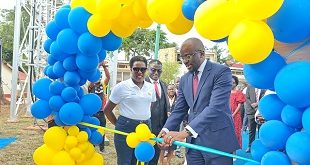
Dr Ekwaro Obuku’s Liteside
Any three things we don’t know about you?
I am resilient, persistent and I really like to work in teams. I also like to empower others to achieve their goals through showing them the way but at the same time, I am quick to cover the gaps.
What is your greatest fear?
As Nelson Mandela said, “I have learnt that courage is not the absence of fear but the ability to overcome fear” so what motivates me is that every individual must find his or her calling in life beyond the basic issues of Maslow’s hierarchy of food, shelter, healthcare, education, etc. There must be something that one does for humanity. So I feel comfortable in the fear of causing positive influence in health sector reform so that healthcare is responsive to the common Ugandan.
What is the trait you most deplore in yourself?
Sometimes I am a perfectionist which makes me self sufficient and that is not a very good characteristic for someone who is trying to build a team. I have to wrestle to give chance to others.
What is the trait you most deplore in others?
Laziness is difficult for me to tolerate because I believe that everybody should be able to help in achieving the group potential.
Which living person do you most admire?
My mother; she chose to live in rural Uganda of Lango where she was married even after the passing of our father.
What is your greatest extravagance?
I have seven children so it’s no doubt that I spend most on them otherwise, being an African man doesn’t present opportunities to be a spendthrift because the opportunity for extravagance never arises.
What is the greatest thing you have ever done?
Skinning an antelope; we did it as six siblings at such a tender age when we were barely adolescents.
What do you consider the most overrated virtue?
Ugandans are calm and welcoming but they could strengthen their civic awareness and participate in social accountability. We should take interest in how much money has been allocated to health and on whether it has been used as assigned. Research indicates that improved participation improves health outcomes.
What does being powerful mean to you?
Being a leader in terms of creating positive influence which lasts even after stepping down. The impact is institutionalised in society thus leaving a legacy.
On what occasion do you lie?
The lie becomes necessary when the intention is to save someone’s life.
What do you most dislike about your appearance?
Going by the biblical teaching of ‘we were all created in the image of God’, I am comfortable.
Which living person do you most despise?
None; humans want and deserve dignity.
What is the quality you most like in a man?
Being responsible, supporting his people and accepting defeat; all factors being constant.
What is the quality you most like in a woman?
The ability to fulfill the functions of a biblical helper despite fulfilling her dreams. She must be the proverbial or biblical rib.
When and where were you happiest?
One of the happiest moments was in 1998 when I got a scholarship to study medicine because my initial admission was to study Bachelor of Science, but I applied for private admission so my parents mobilised resources which was quite a lot and upon reaching the university to pay, I got hold of another admission on government scholarship. I had to return all the money to my father and we were all overjoyed.
The other moments that make me very happy are spending time with my children; especially now that I am older; I appreciate young children better as opposed to initial times when it was quite difficult to take care of the young family.
The other happy moment is when I find spontaneous organisation and cooperation among doctor groups.
Which talent would you most like to have?
Mobilisation and organisation of people as well as the ability to write persuasive papers that tell stories.
What do you consider your greatest achievement?
It is still work in progress. For instance with UMA, we have strengthened governance, improved participation by all groups of doctors, tripled subscribed membership and we are currently setting the agenda of health. This will enable us be part of the winning formula of increasing access to medical or health services.
Where would you most like to live?
Uganda has come a long way from where it was and it has relatively stabilised.
What is your most treasured possession?
MBChB degree; it’s an international visa and no one can take away my brain.
What do you regard as the lowest depth of misery?
Poverty to the level of not accessing social security in terms of food, shelter and education.
What is your favorite occupation?
Practicing medicine is a calling that I respect. I am in a position of leadership, practicing health policy dealing with the politics of medicine; including the people, problems and prepositions.
What do you most value in your friends?
Loyalty, being reliable and sticking to the plan
Who are your favorite writers?
Chinua Achebe and Elechi Amadi are very good writers.
Which historical figure do you most identify with?
I love the local African leaders particularly Kabalega; it fascinates me how at that time, an African king with low cost technology was able to get high impact in terms of fighting for independence of Ugandans. He took cover in Lango which also motivates me.
Who are your heroes in real life?
King Kabalega of Bunyoro, Dr Margaret Mungherera and Dr. JB Obuku who taught me resilience. He once said ‘my son, nothing in this world is final and absolute good in this world is impossible’. I am still living by that.
What is your greatest regret?
There are sad moments but some are beyond me for instance the fact that I am not able to be with my father.
How would you like to die?
I don’t mind going in any way.
What is your motto?
Seriousness of purpose.
 The Independent Uganda: You get the Truth we Pay the Price
The Independent Uganda: You get the Truth we Pay the Price




Was wondering all along how and from where this fellow derives courage and steadfastness that seem to multiply by the day. Now I have the answer. He is a God-fearing Christian.
Dr Obuku, you parents deserve a medal. We know nurture indeed can produce men of integrity like this wonderful gentleman.
Doctors and other medical personnel should be paid well. Everything starts with life .All systems on earth depend on there being life first. Education ,housing,agriculture,,textiles ,law,defence,gorvenance etc etc. We cannot therefore pretend not know the value of medical personnel as far as preserving life is concerned.The best paid personnel should be those who can save lives.All other displines should come next .You cannot cloth,feed,house,legally defend,politically defend ,legislate for a non existing life.Unless the value of life has changed,let us preserve life first by taking care of the life keepers.
Dr. Am grateful for your deeds. You give God reasons to smile for Corruption knows never got your address. Let UNATU learn from you.
Dr. Am grateful for your deeds. You give God reasons to smile since Corruption never got your address. Let UNATU learn from you.
You have fought a good battle.
You’ve inspired us and “me” in particular that I should join the same struggle when am done with medical school to advocate for better working conditions foe mt fellow countrymen in the health sector. Keep watching
ALUTA CONTINUA!